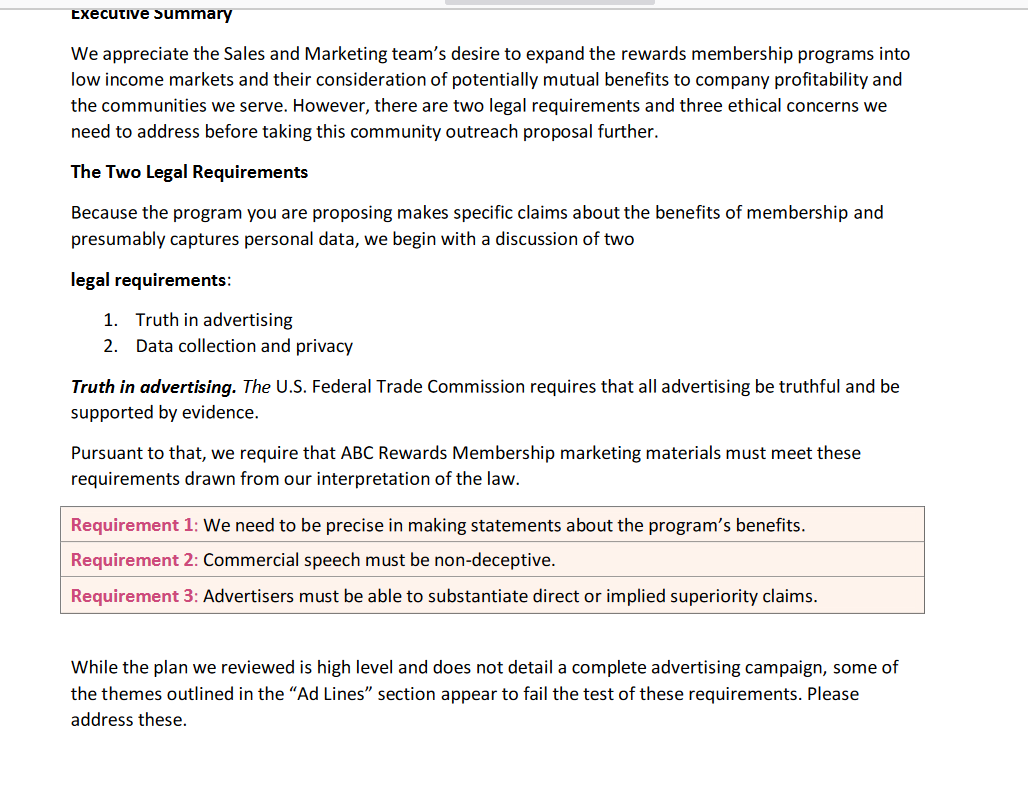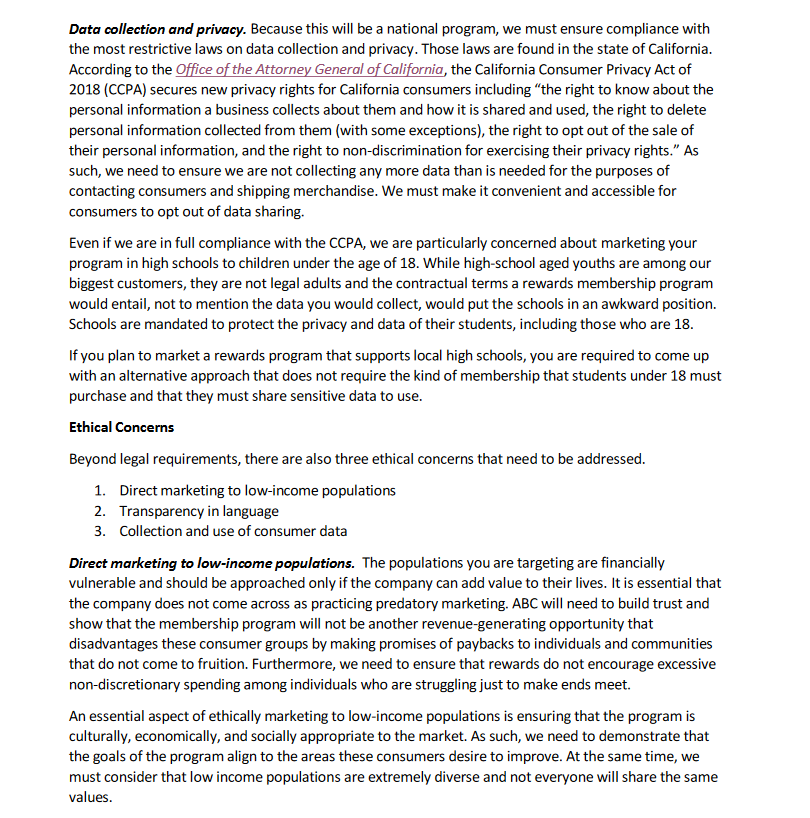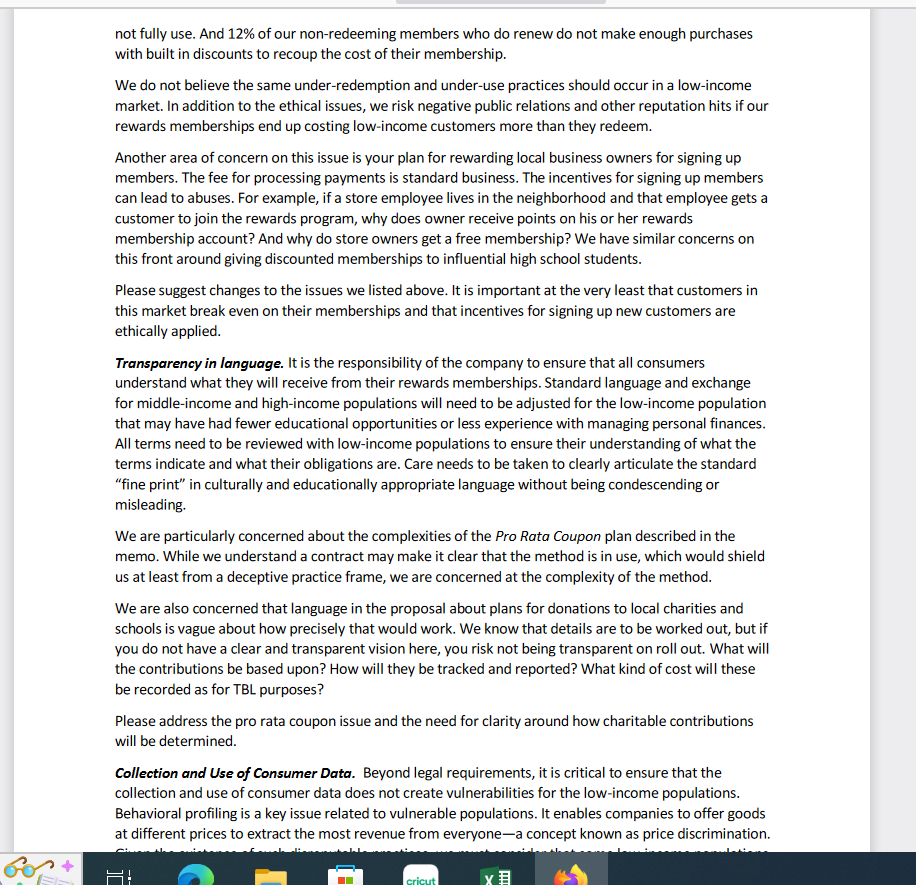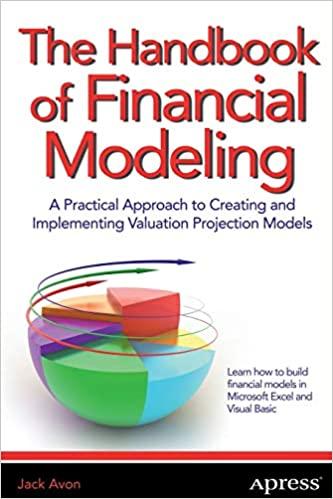Answered step by step
Verified Expert Solution
Question
1 Approved Answer
s Evaluate the plan for legal issues . Where in the proposal do the issue occur? Recommend changes to address the legal concerns . Cite


 s
s
Evaluate the plan for legal issues.
Where in the proposal do the issue occur?
Recommend changes to address the legal concerns.
Cite or quote their language to show what you are addressing.
State what aspects of the plan need to change in some way to address the concern.
Recommend one or more possible changes.
Explain how your recommendations meet the legal requirements.
We appreciate the Sales and Marketing team's desire to expand the rewards membership programs into low income markets and their consideration of potentially mutual benefits to company profitability and the communities we serve. However, there are two legal requirements and three ethical concerns we need to address before taking this community outreach proposal further. The Two Legal Requirements Because the program you are proposing makes specific claims about the benefits of membership and presumably captures personal data, we begin with a discussion of two legal requirements: 1. Truth in advertising 2. Data collection and privacy Truth in advertising. The U.S. Federal Trade Commission requires that all advertising be truthful and be supported by evidence. Pursuant to that, we require that ABC Rewards Membership marketing materials must meet these requirements drawn from our interpretation of the law. Requirement 1: We need to be precise in making statements about the program's benefits. Requirement 2: Commercial speech must be non-deceptive. Requirement 3: Advertisers must be able to substantiate direct or implied superiority claims. While the plan we reviewed is high level and does not detail a complete advertising campaign, some of the themes outlined in the "Ad Lines" section appear to fail the test of these requirements. Please address these. Data collection and privacy. Because this will be a national program, we must ensure compliance with the most restrictive laws on data collection and privacy. Those laws are found in the state of California. According to the Office of the Attorney General of California, the California Consumer Privacy Act of 2018 (CCPA) secures new privacy rights for California consumers including "the right to know about the personal information a business collects about them and how it is shared and used, the right to delete personal information collected from them (with some exceptions), the right to opt out of the sale of their personal information, and the right to non-discrimination for exercising their privacy rights." As such, we need to ensure we are not collecting any more data than is needed for the purposes of contacting consumers and shipping merchandise. We must make it convenient and accessible for consumers to opt out of data sharing. Even if we are in full compliance with the CCPA, we are particularly concerned about marketing your program in high schools to children under the age of 18 . While high-school aged youths are among our biggest customers, they are not legal adults and the contractual terms a rewards membership program would entail, not to mention the data you would collect, would put the schools in an awkward position. Schools are mandated to protect the privacy and data of their students, including those who are 18. If you plan to market a rewards program that supports local high schools, you are required to come up with an alternative approach that does not require the kind of membership that students under 18 must purchase and that they must share sensitive data to use. Ethical Concerns Beyond legal requirements, there are also three ethical concerns that need to be addressed. 1. Direct marketing to low-income populations 2. Transparency in language 3. Collection and use of consumer data Direct marketing to low-income populations. The populations you are targeting are financially vulnerable and should be approached only if the company can add value to their lives. It is essential that the company does not come across as practicing predatory marketing. ABC will need to build trust and show that the membership program will not be another revenue-generating opportunity that disadvantages these consumer groups by making promises of paybacks to individuals and communities that do not come to fruition. Furthermore, we need to ensure that rewards do not encourage excessive non-discretionary spending among individuals who are struggling just to make ends meet. An essential aspect of ethically marketing to low-income populations is ensuring that the program is culturally, economically, and socially appropriate to the market. As such, we need to demonstrate that the goals of the program align to the areas these consumers desire to improve. At the same time, we must consider that low income populations are extremely diverse and not everyone will share the same values. not fully use. And 12% of our non-redeeming members who do renew do not make enough purchases with built in discounts to recoup the cost of their membership. We do not believe the same under-redemption and under-use practices should occur in a low-income market. In addition to the ethical issues, we risk negative public relations and other reputation hits if our rewards memberships end up costing low-income customers more than they redeem. Another area of concern on this issue is your plan for rewarding local business owners for signing up members. The fee for processing payments is standard business. The incentives for signing up members can lead to abuses. For example, if a store employee lives in the neighborhood and that employee gets a customer to join the rewards program, why does owner receive points on his or her rewards membership account? And why do store owners get a free membership? We have similar concerns on this front around giving discounted memberships to influential high school students. Please suggest changes to the issues we listed above. It is important at the very least that customers in this market break even on their memberships and that incentives for signing up new customers are ethically applied. Transparency in language. It is the responsibility of the company to ensure that all consumers understand what they will receive from their rewards memberships. Standard language and exchange for middle-income and high-income populations will need to be adjusted for the low-income population that may have had fewer educational opportunities or less experience with managing personal finances. All terms need to be reviewed with low-income populations to ensure their understanding of what the terms indicate and what their obligations are. Care needs to be taken to clearly articulate the standard "fine print" in culturally and educationally appropriate language without being condescending or misleading. We are particularly concerned about the complexities of the Pro Rata Coupon plan described in the memo. While we understand a contract may make it clear that the method is in use, which would shield us at least from a deceptive practice frame, we are concerned at the complexity of the method. We are also concerned that language in the proposal about plans for donations to local charities and schools is vague about how precisely that would work. We know that details are to be worked out, but if you do not have a clear and transparent vision here, you risk not being transparent on roll out. What will the contributions be based upon? How will they be tracked and reported? What kind of cost will these be recorded as for TBL purposes? Please address the pro rata coupon issue and the need for clarity around how charitable contributions will be determined. Collection and Use of Consumer Data. Beyond legal requirements, it is critical to ensure that the collection and use of consumer data does not create vulnerabilities for the low-income populations. Behavioral profiling is a key issue related to vulnerable populations. It enables companies to offer goods at different prices to extract the most revenue from everyone-a concept known as price discrimination. We appreciate the Sales and Marketing team's desire to expand the rewards membership programs into low income markets and their consideration of potentially mutual benefits to company profitability and the communities we serve. However, there are two legal requirements and three ethical concerns we need to address before taking this community outreach proposal further. The Two Legal Requirements Because the program you are proposing makes specific claims about the benefits of membership and presumably captures personal data, we begin with a discussion of two legal requirements: 1. Truth in advertising 2. Data collection and privacy Truth in advertising. The U.S. Federal Trade Commission requires that all advertising be truthful and be supported by evidence. Pursuant to that, we require that ABC Rewards Membership marketing materials must meet these requirements drawn from our interpretation of the law. Requirement 1: We need to be precise in making statements about the program's benefits. Requirement 2: Commercial speech must be non-deceptive. Requirement 3: Advertisers must be able to substantiate direct or implied superiority claims. While the plan we reviewed is high level and does not detail a complete advertising campaign, some of the themes outlined in the "Ad Lines" section appear to fail the test of these requirements. Please address these. Data collection and privacy. Because this will be a national program, we must ensure compliance with the most restrictive laws on data collection and privacy. Those laws are found in the state of California. According to the Office of the Attorney General of California, the California Consumer Privacy Act of 2018 (CCPA) secures new privacy rights for California consumers including "the right to know about the personal information a business collects about them and how it is shared and used, the right to delete personal information collected from them (with some exceptions), the right to opt out of the sale of their personal information, and the right to non-discrimination for exercising their privacy rights." As such, we need to ensure we are not collecting any more data than is needed for the purposes of contacting consumers and shipping merchandise. We must make it convenient and accessible for consumers to opt out of data sharing. Even if we are in full compliance with the CCPA, we are particularly concerned about marketing your program in high schools to children under the age of 18 . While high-school aged youths are among our biggest customers, they are not legal adults and the contractual terms a rewards membership program would entail, not to mention the data you would collect, would put the schools in an awkward position. Schools are mandated to protect the privacy and data of their students, including those who are 18. If you plan to market a rewards program that supports local high schools, you are required to come up with an alternative approach that does not require the kind of membership that students under 18 must purchase and that they must share sensitive data to use. Ethical Concerns Beyond legal requirements, there are also three ethical concerns that need to be addressed. 1. Direct marketing to low-income populations 2. Transparency in language 3. Collection and use of consumer data Direct marketing to low-income populations. The populations you are targeting are financially vulnerable and should be approached only if the company can add value to their lives. It is essential that the company does not come across as practicing predatory marketing. ABC will need to build trust and show that the membership program will not be another revenue-generating opportunity that disadvantages these consumer groups by making promises of paybacks to individuals and communities that do not come to fruition. Furthermore, we need to ensure that rewards do not encourage excessive non-discretionary spending among individuals who are struggling just to make ends meet. An essential aspect of ethically marketing to low-income populations is ensuring that the program is culturally, economically, and socially appropriate to the market. As such, we need to demonstrate that the goals of the program align to the areas these consumers desire to improve. At the same time, we must consider that low income populations are extremely diverse and not everyone will share the same values. not fully use. And 12% of our non-redeeming members who do renew do not make enough purchases with built in discounts to recoup the cost of their membership. We do not believe the same under-redemption and under-use practices should occur in a low-income market. In addition to the ethical issues, we risk negative public relations and other reputation hits if our rewards memberships end up costing low-income customers more than they redeem. Another area of concern on this issue is your plan for rewarding local business owners for signing up members. The fee for processing payments is standard business. The incentives for signing up members can lead to abuses. For example, if a store employee lives in the neighborhood and that employee gets a customer to join the rewards program, why does owner receive points on his or her rewards membership account? And why do store owners get a free membership? We have similar concerns on this front around giving discounted memberships to influential high school students. Please suggest changes to the issues we listed above. It is important at the very least that customers in this market break even on their memberships and that incentives for signing up new customers are ethically applied. Transparency in language. It is the responsibility of the company to ensure that all consumers understand what they will receive from their rewards memberships. Standard language and exchange for middle-income and high-income populations will need to be adjusted for the low-income population that may have had fewer educational opportunities or less experience with managing personal finances. All terms need to be reviewed with low-income populations to ensure their understanding of what the terms indicate and what their obligations are. Care needs to be taken to clearly articulate the standard "fine print" in culturally and educationally appropriate language without being condescending or misleading. We are particularly concerned about the complexities of the Pro Rata Coupon plan described in the memo. While we understand a contract may make it clear that the method is in use, which would shield us at least from a deceptive practice frame, we are concerned at the complexity of the method. We are also concerned that language in the proposal about plans for donations to local charities and schools is vague about how precisely that would work. We know that details are to be worked out, but if you do not have a clear and transparent vision here, you risk not being transparent on roll out. What will the contributions be based upon? How will they be tracked and reported? What kind of cost will these be recorded as for TBL purposes? Please address the pro rata coupon issue and the need for clarity around how charitable contributions will be determined. Collection and Use of Consumer Data. Beyond legal requirements, it is critical to ensure that the collection and use of consumer data does not create vulnerabilities for the low-income populations. Behavioral profiling is a key issue related to vulnerable populations. It enables companies to offer goods at different prices to extract the most revenue from everyone-a concept known as price discriminationStep by Step Solution
There are 3 Steps involved in it
Step: 1

Get Instant Access to Expert-Tailored Solutions
See step-by-step solutions with expert insights and AI powered tools for academic success
Step: 2

Step: 3

Ace Your Homework with AI
Get the answers you need in no time with our AI-driven, step-by-step assistance
Get Started


